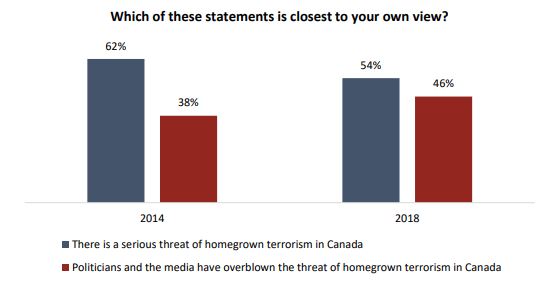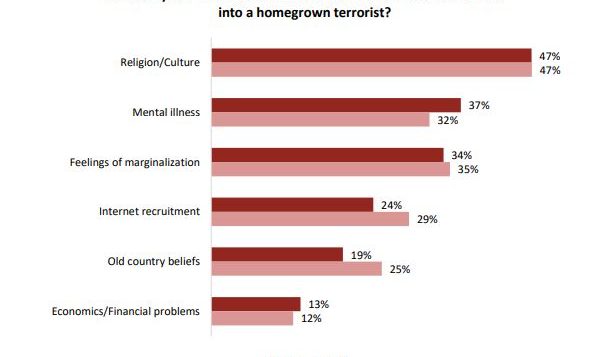Canadians feel less concerned about homegrown terrorism today than they were four years ago when the country was shaken by back-to-back deadly attacks on Canadian soldiers followed by the shooting on Parliament Hill, according to a new public opinion poll from the Angus Reid Institute.
The poll shows that just over half of Canadians (54 per cent) see radical Islam as cause for “a great deal of concern,” while 44 per cent are very concerned about the prospect of white supremacist or white nationalist homegrown terrorism, said Shachi Kurl, executive director of the Angus Reid Institute.
Nearly one-quarter (24 per cent) say no such individuals exist where they live, and the rest (35 per cent) are unsure, Kurl said.
“I think part of what’s behind this number is a sense of the unknown,” Kurl said in phone interview. “Increasingly Canada is urbanized, increasingly Canadians are living lives that are more remote and separate from each other.”
(click to listen to the full interview with Shachi Kurl)
Listen
Source: Angus Reid Institute
More Canadians than ever are living alone in single-occupant households and are ignorant of their neighbours, she said.
“More and more are living their lives online,” Kurl said. “And it also speaks to a recognition of the fact that Canadians know that their neighbours, their fellow co-workers or the people at the coffee shop or people at their gym, someone in there, may be spending a lot of time online and may be subjecting themselves to or exposing themselves to radicalized thought.”
There is also an age and gender divide in how Canadians approach these issues, the poll conducted in partnership with the Canadian Race Relations Foundation showed.
“Young women, for example, more so than middle-aged or older women and more than men in any age group are more likely to say that white supremacist terrorism is more of a serious threat than radical Islamist terrorism is,” Kurl said.

Source: Angus Reid Institute
Another big driver of opinion is political partisanship.
“People who tend to lean to the right side of the political spectrum say that Canadians are more threatened by radical Islam and far less so by white supremacy,” Kurl said. “Whereas among people who are centre and centre-left in terms of their political outlook view both threats equally.”
Nevertheless, most Canadians see the country’s Muslim community as a partner in the fight against radicalization and homegrown terrorism, rather than a part of the problem, Kurl said.
Also, slightly over half of Canadians (54 per cent) say they have confidence in the ability of the country’s security services – the Canadian Security and Intelligence Service (CSIS), the Royal Canadian Mounted Police (RCMP), and local police forces – to prevent acts of homegrown terrorism.







For reasons beyond our control, and for an undetermined period of time, our comment section is now closed. However, our social networks remain open to your contributions.